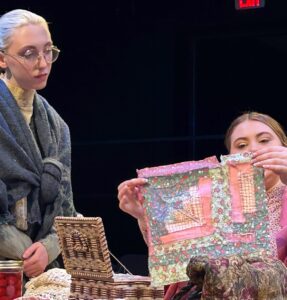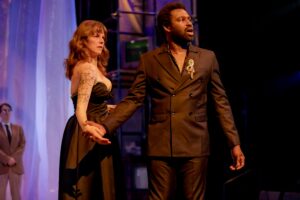Review by Doug Iden
Based on the folktale of the Iron Mountain Baby, Bright Star spins a tale of love, longing, misplaced morality, and redemption now showing at the Covedale Theater.
Plot and Characters
Set in 1945 with flashbacks to 1923, the story examines life in rural North Carolina. The show opens with editor Alice Murphy (Bethany Kerr) telling her story in song. She sings, not about the books she edits, but her own life which includes the loss of her baby boy. World War II vet Billy Cane (Elliot Handkins) tells his friend Margo (Jordan Darnell) that he wants to publish some stories.
In 1923, Alice becomes pregnant with boyfriend Jimmy Ray’s (Christopher Wells) baby. However, Jimmy Ray’s father Mayor Dobbs (Ryan Poole) decides that the family reputation is more important than a bastard child. As the play unfolds, the stories interrelate in the Then and Now scenario.
Themes of Bright Star
Alice is haunted by the specter of her lost son and keeps searching for answers. The Mayor, the Doctor (Ed Cohen) and Alice’s father (Gregory Shaffer) try to balance religious morality with self-interest and financial greed. Billy envisions himself as the Great American Southern writer. There is also a contrast between rural, southern society and life in the big city of Asheville. Another theme is the value of an education versus the potential danger of ignorance,

Musical Highlights
Infused by bluegrass and country music (not normally heard on Broadway), SNL veteran comedian Steve Martin co-authored the music and wrote the book. Edie Brickell co-wrote the music and added the lyrics. The songs were based on a bluegrass album they co-composed. Alice’s opening soliloquy “If You Knew My Story” opens the play. In the title song, Billy declares his need to write, aided by the ensemble. The transition to 1923 occurs during the “Way Back in the Day” number. Later, Alice dreams of her child (“I Can’t Wait”) and then implores the Mayor and the Doctor in the gut-wrenching “Please Don’t Take Him”. Mayor Dobbs shows his true colors in the conviction that “A Man’s Gotta Do.”
Alice and Jimmy Ray declare their love in 1923 with the duet “What Could be Better” and reunite later with “I Had a Vision.” The other set of lovers (Margo and Billy) share their sentiments with “Always Will.” The prerecorded music led by Mark Femia features fiddles and banjos. The entire cast is on stage most of the time and frequently accompanies the solo singers, often with tight, bluegrass harmonies.
Kerr’s performance as Alice is a major highlight combining acting as a teenager and an adult with an excellent singing voice. Handkins (Billy), Wells (Jimmy Ray) and Darnell (Margo) all contribute to the quality of the singing.

Technical
The plot is complex with the back-and-forth between the two time periods so it requires more concentration than normal for a musical. Director Ed Cohen, along with a screen which identifies the locations and dates of the scene, moves the action along and clarifies the story as it progresses. Brett Bowling’s designs are interesting by meshing a rustic look with some surrealism including a grandfather clock which subs as a tree. The background, along with lighting by Denny Reed, reminds us of the locale in the Blue Ridge Mountains. Certain sound effects (especially of the train) help propel the story, designed by Jamie Steele.
The mostly rural setting is reflected in costumes by June Hill and Jesselee Whitson, including work clothes, suspenders, and hats. The Mayor wears a business suit. Alice wears the same blue dress for both time periods but changes her hairstyle from braids (as a teenager) to an adult style. There are two major dances co-choreographed by Jay and Jenny Goodlett which show the contrast between rural (with square dancing) and 1940’s city life with “Another Round” featuring Cassidy Steele’s jitterbug. Several numbers feature foot-stomping.

Overall
This show, to me, is an undiscovered gem, combining musical high-jinks with serious drama concerning the apparent fate of the baby. Because of Steve Martin’s book, there is also a lot of comedy including spoofing rural life and lack of education. The show has a lot of heart propelled by the bluegrass score and good performances and singing throughout.
Tickets to Bright Star
So, grab your banjo and mosey on down to Covedale Theater to see the shining Bright Star through October 1. Purchase your tickets ONLINE or call the Box Office at 513-241-6550, Monday through Friday, 11am – 5pm.
Covedale’s next production is Freaky Friday running from October 12 through November 5.






